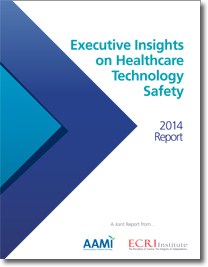ECRI and AAMI join over health care technology safety
by
Lauren Dubinsky, Senior Reporter | July 01, 2014

ECRI Institute and the Association for the Advancement of Medical Instrumentation (AAMI) teamed up to create the first report to help medical device and health care delivery executives recognize and monitor technology safety issues.
The report is called Executive Insights on Healthcare Technology Safety, and it addresses five major technology safety issues — alarm systems, Luer connectors, cybersecurity, batteries and recalls. Both ECRI and AAMI believe that there is a need to focus on these issues now more than ever.
"The complexities of technology are growing," Mary Logan, president of AAMI, told DOTmed News. "Health care is more and more dependent on technology that is getting more and more complex."
Jim Keller, vice president of health technology evaluation and safety at ECRI, told DOTmed News that one of the key takeaway points of the report is the increase in product recalls over the years. "There are many factors for why this has happened, but the large increase in the number of medical devices on the market and the increased complexity of devices that are being used out there are some of the most important factors," he said.
The organizations chose each of the safety issues by evaluating product recalls, safety notices, complaints, adverse incident reports, FDA priorities, and analyses of recurring issues that technology experts cite. They chose a broad range of issues that might not necessarily be in the forefront of executives' minds, said Logan.
"Everybody talks about the EHR and the challenges of implementing it - you don't hear people talk very much about batteries," she said. "We wanted to put out the issues that we think are really important, that might not already be on somebody's radar screen."
The FDA made medical device batteries a top priority because of the amount and severity of reported issues with them. The report recommends that the executives avoid purchasing the cheapest batteries available because of the risk of recalls and failed devices.
Another understated safety issue is Luer misconnections or small-bore connector issues. "The small-bore connector issue hasn't really been on anybody's radar screen unless they had a death in their hospital from it, but we know it's coming and it's going to be big," said Logan.
On the other hand, alarm safety is an issue on many people's minds. The report references the new accreditation requirements from The Joint Commission to help with that. Cybersecurity has also become a hot topic in the health care industry in recent years and the report recommends that the executives adopt security best practices from other industries and make an assessment before making purchasing decisions.
Instead of creating a long, thorough report, the organizations decided to create a shorter report featuring questions that they think the executives should ask themselves. "We were really careful to design our report to be succinct and to the point," said Keller. "If we were to create a long treatise on these topics it just wouldn't get the attention of our target audience because of their extremely busy schedules."
Both organizations plan to work together to update the report next year. ECRI's new Top 10 Technology Safety Hazards report that is set to come out November will be one of the items that they will be looking at as they update the health care technology safety report.
|
|
|
You Must Be Logged In To Post A Comment
|
